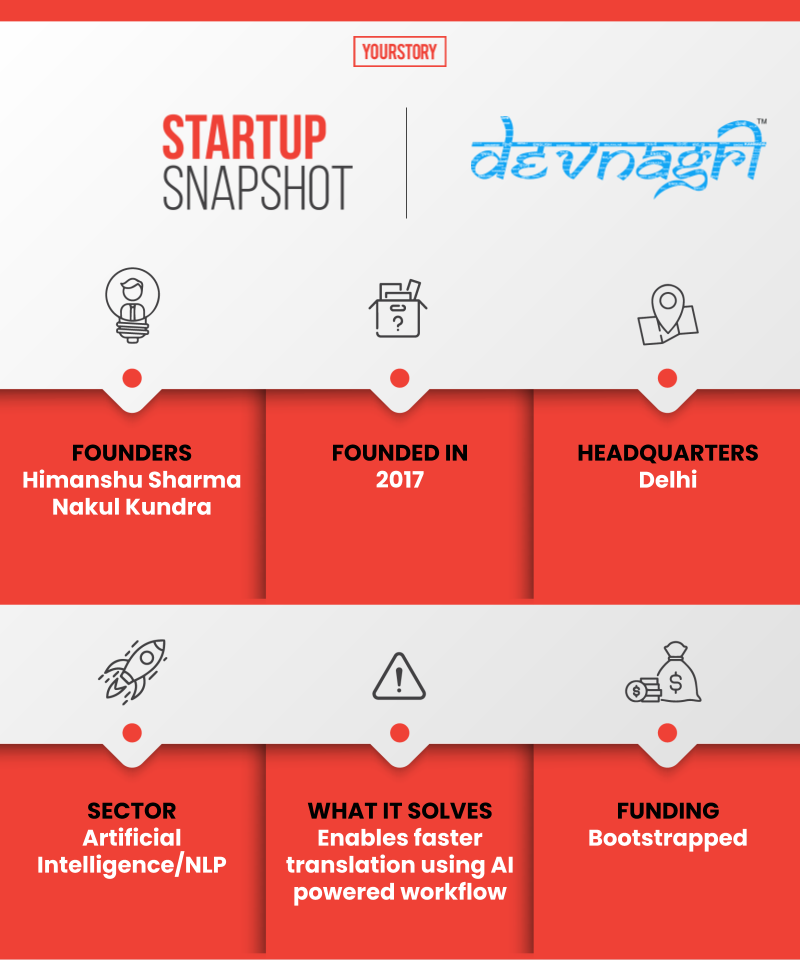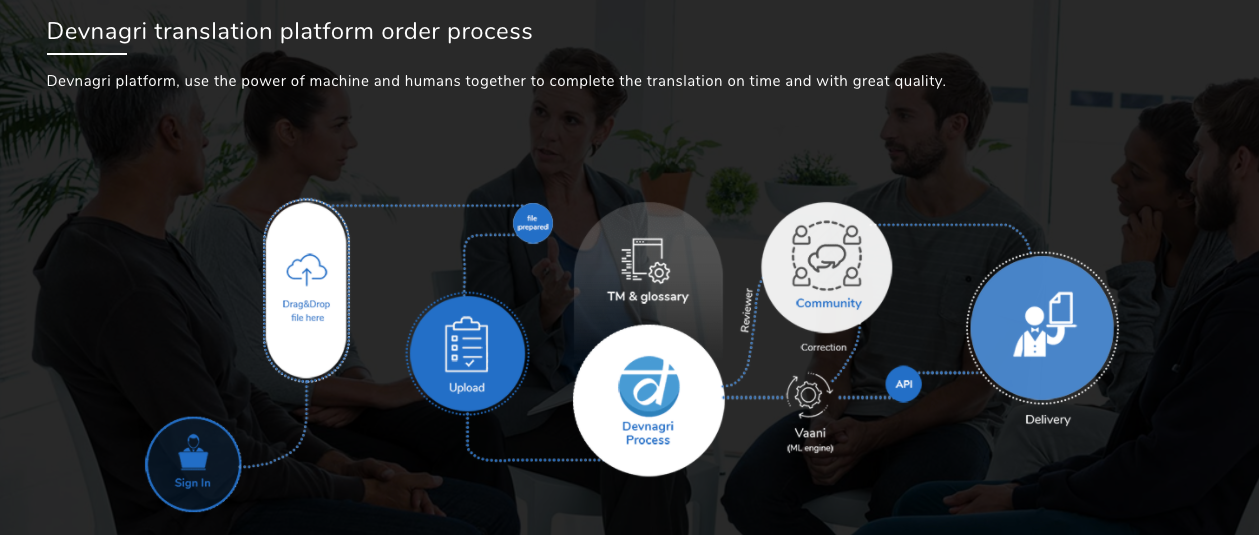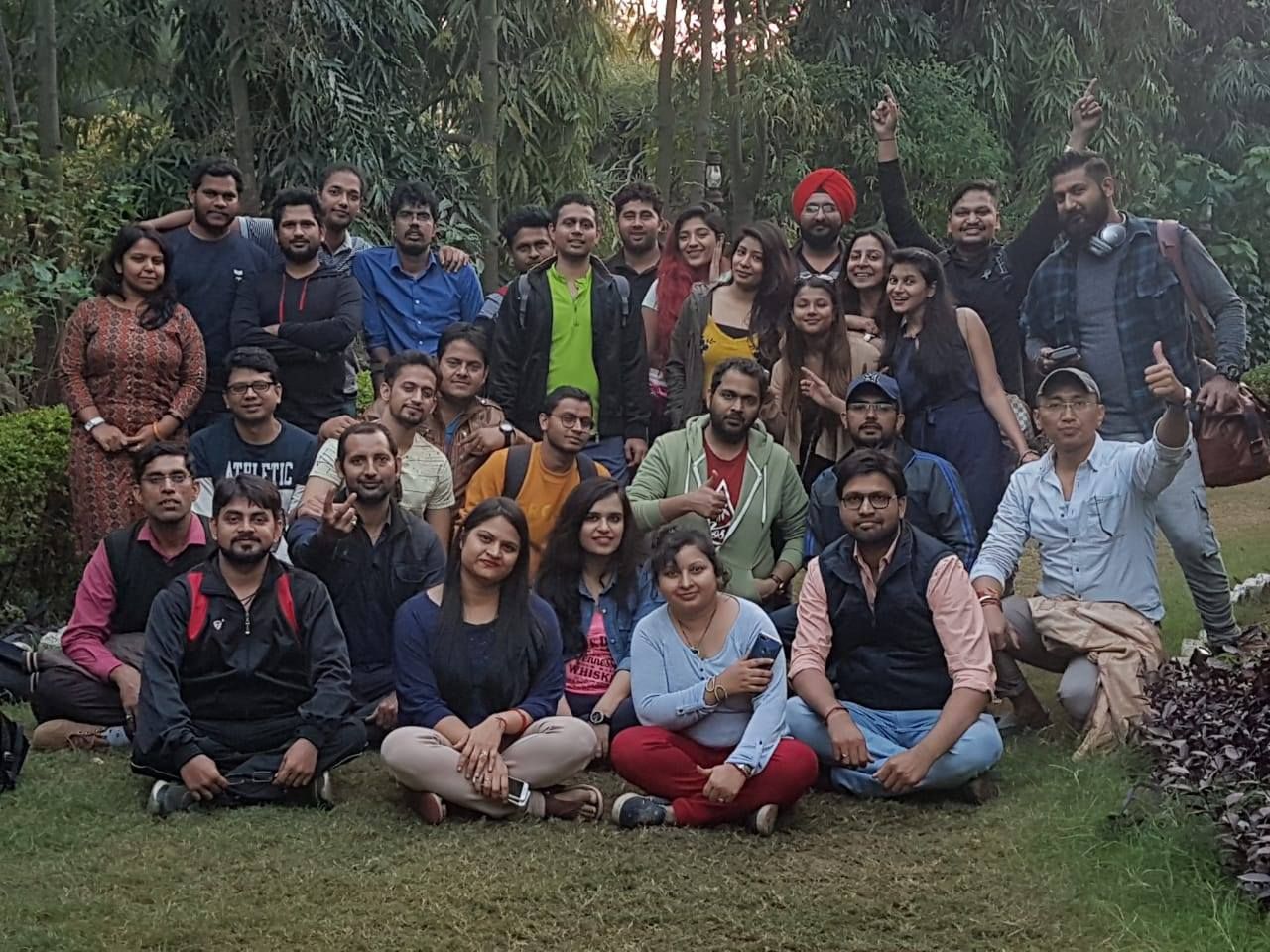The Devanagri script is the fourth most widely adopted writing system in the world, and is used for more than 120 languages.
Inspired by the versatility and diversity of the script and the many Indian languages that use it, Himanshu Sharma and Nakul Kundra founded AI-powered startup Devnagri.
The Delhi-based startup runs a human translation platform, a combination of neural machine translation and machine learning, and harnesses the power of community to contextualise content. Translation services are available in 22 Indian languages.

Nakul Kundra and Himanshu Sharma
“We help businesses translate their software communication tools at scale, into Indian languages. We can process millions of words every day and provide much more accuracy than traditional translation platforms,” Himanshu says.
Multiple translation tools and applications are now available, but their efficiency and accuracy is questionable.
The founder claims that Devnagri is at least 10 times more efficient and accurate than other translation platforms, due to the human intervention in the translation processes.
The bootstrapped startup was awarded the Best Emerging Portal For Translation & Localisation Services 2019 – INDIA by Business Mint in 2019. In 2020, Devnagri was selected in the Special Category at RAISE 2020, India’s biggest AI Solution Challenge for Indian startups, in the Natural Language Processing (NLP) category.

Credit: YS Design
How does it work?
All data is fed into the platform, which provides a rough translation of the content. The platform uses an end-to-end open-source machine learning by Google called TensorFlow, used for NLP. Devnagri has built its own proprietary translation engine using TensorFlow.
However, just using machine systems has a problem: the absence of context, which means the translation is not accurate.
“The translation done by the machine is further processed by human intervention to contextualise the content. Feedback is constantly provided to bring more relevance to content, improving the accuracy with every run,” he adds.

Devnagri's translation process
Devnagri offers three kinds of products – translation, real-time translation, and transliteration.
With the first product, clients can upload their text into the platform and Devnagri’s AI-based services and human translators provide an accurate translation, into about 11 different languages, based on their requirement.
The second product is called Devangri on the Air (DOTA), and is a JavaScript plugin that the user can add to their browser or application to enable real-time translation of any webpage or software, without the need for any kind of coding.
The Devangri Transliteration Application Programming Interface (API) helps rewrite product lists, names, and addresses in Indian languages.
This is essential because often proper nouns are converted to their literal translation. For example, “The King’s Palace” should transliterate to “दी किंग्स पैलेस” rather than “राजा का महल".
“This feature has been extensively used by our delivery service client, Transport Bhavan. Delivery people, fluent in just one language, can read the details in their own language and avoid confusion. While Devnagri and DOTA need human intervention, the transliteration API does not,” Himanshu explains.
What the Kutumbh does
Kutumbh, which translates into family, is Devnagri’s community of 5,000 translators. Each of these translators knows a minimum of two Indian languages, along with English. Apart from them, there are 16 passionate employees who work with the organisation.
“In India, most digital data is in English so these translators need to be fluent in the language. Moreover, the demand for translation from one Indian language to another is less, thereby making it easy to find translators,” Himanshu says.

Team Devnagri
While a majority of translations are from English to local languages, Devnagri also takes up projects involving international languages like French, Spanish, Arabic, Japanese, Italian, and Chinese languages.
Whenever a new project is taken up, the system breaks it up into smaller bits of work and distributes it to the translator of that particular language. This division helps Devnagri to translate a million words on a daily basis, with 99 percent accuracy.
At present, Devangri has more than 30 clients including the United Nations Organisation, Centre for Development of Advanced Computing (C-DAC), PhonePe, Myntra, and Snapdeal.
“We do a yearly contract with our clients, but it entirely depends on the size of the contract, especially since we follow a daily rate of two million words,” Himanshu says. “The cost of translation ranges from anything between 50 paise to Rs 2 per word. So, pricing is based on the number of words and the volume of content.”
COVID-19 and the future
Business fell during the first two months of the COVID-19-led lockdown. However, things improved and the startup clocked revenue of Rs 3 crore in the first eight months of 2020.
“The pandemic led to a spike in the number of translator registrations. The convenience of working from home and minimal prerequisites led to this,” Himanshu says. New translators are trained through webinars and online courses, and receive timely feedback that helps refine their skills.
The startup was initially bootstrapped with an amount of Rs 1 crore; the founders are now actively looking for investors.
Himanshu says the startup is working on a subtitling project, where a “10-minute video can be subtitled into eight Indian languages in 15 minutes”.
While there is no direct competition, the nearest competition in the NLP sector includes Process9 Technologies and Reverie Language Technologies. However, their localisation processes are entirely different.
The team is also working on a voice-based system that can be used as a data collector for the many Indian language dialects. This could later be used to train voice assistants like Amazon’s Alexa.
“Men and machines are a great combination, especially now with AI. They will go a long way and are the future of digitisation,” Himanshu says.
Edited by Teja Lele Desai
Link : https://yourstory.com/2020/10/raise-2020-ai-startup-devangri-translation-services
Author :- Anju Ann Mathew ( )
October 28, 2020 at 05:25AM
YourStory


